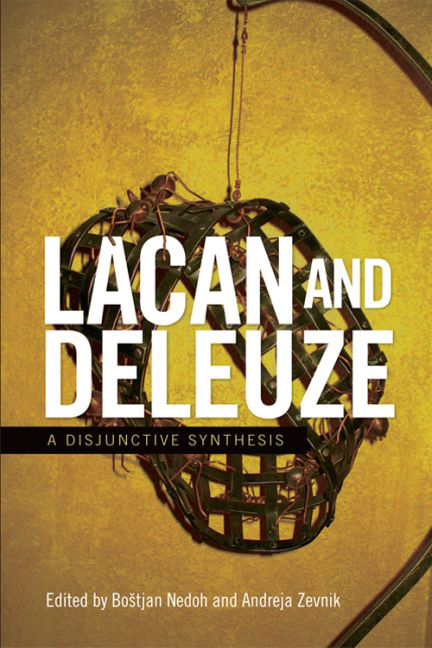Book contents
- Frontmatter
- Contents
- Acknowledgements
- Introduction: On a Disjunctive Synthesis between Lacan and Deleuze
- 1 For Another Lacan-Deleuze Encounter
- 2 Reciprocal Portrait of Jacques Lacan in Gilles Deleuze
- 3 Does the Body without Organs Have Any Sex at All? Lacan and Deleuze on Perversion and Sexual Difference
- 4 Gnomonology: Deleuze's Phobias and the Line of Flight between Speech and the Body
- 5 Lacan, Deleuze and the Politics of the Face
- 6 Denkwunderkeiten: On Deleuze, Schreber and Freud
- 7 Snark, Jabberwock, Poord'jeli: Deleuze and the Lacanian School on the Names-of-the-Father
- 8 Baroque Structuralism: Deleuze, Lacan and the Critique of Linguistics
- 9 Exalted Obscenity and the Lawyer of God: Lacan, Deleuze and the Baroque
- 10 The Death Drive
- 11 Repetition and Difference: Žižek, Deleuze and Lacanian Drives
- 12 Lacan, Deleuze and the Consequences of Formalism
- Notes on Contributors
- Index
3 - Does the Body without Organs Have Any Sex at All? Lacan and Deleuze on Perversion and Sexual Difference
Published online by Cambridge University Press: 20 April 2017
- Frontmatter
- Contents
- Acknowledgements
- Introduction: On a Disjunctive Synthesis between Lacan and Deleuze
- 1 For Another Lacan-Deleuze Encounter
- 2 Reciprocal Portrait of Jacques Lacan in Gilles Deleuze
- 3 Does the Body without Organs Have Any Sex at All? Lacan and Deleuze on Perversion and Sexual Difference
- 4 Gnomonology: Deleuze's Phobias and the Line of Flight between Speech and the Body
- 5 Lacan, Deleuze and the Politics of the Face
- 6 Denkwunderkeiten: On Deleuze, Schreber and Freud
- 7 Snark, Jabberwock, Poord'jeli: Deleuze and the Lacanian School on the Names-of-the-Father
- 8 Baroque Structuralism: Deleuze, Lacan and the Critique of Linguistics
- 9 Exalted Obscenity and the Lawyer of God: Lacan, Deleuze and the Baroque
- 10 The Death Drive
- 11 Repetition and Difference: Žižek, Deleuze and Lacanian Drives
- 12 Lacan, Deleuze and the Consequences of Formalism
- Notes on Contributors
- Index
Summary
According to the widespread common opinion, which is hegemonic and determines the ongoing debates about the relation between Deleuze's and Lacan's respective thoughts after a period of mutual respect and attention in the 1960s, the break between the two, and Deleuze's consequent ‘revolt’ against psychoanalysis, occurred in 1972 with Deleuze's publication of the book Anti-Oedipus, co-authored with his friend and theoretical partner from that period on, Félix Guattari. Considering contemporary debates on this topic, one of the greatest proponents of Deleuze's thought in general and of this apparent break in particular, Éric Alliez, goes even further in this schema and locates Deleuze's arrival at the unquestionable imperative to ‘withdraw from psychoanalysis completely’ in the publication of A Thousand Plateaus (1980) and traces this back to ‘a certain ambivalence maintained by the Anti-Oedipus with respect to Lacan’.
More precisely, Alliez relocates this shift after referring (mainly) to the famous chapter in A Thousand Plateaus entitled ‘How Do You Make Yourself a Body without Organs?’, in which Deleuze and Guattari formulate their own kind of anti-psychoanalytical ‘categorical imperative’, which imposes the necessity to construct a ‘body without organs’ or the ‘field of immanence’. Occupying a central role in this construct is the transformation of the Lacanian notion of desire: if, according to Lacan, desire is inherently connected to the moment of negativity in the constitution of the human psyche, that is, to castration and the emergence of the object-cause of desire, then in Deleuze and Guattari's field of immanence, desire is transformed in such a way that ‘[it] lacks nothing and therefore cannot be linked to any external or transcendent criterion’. In other words, for Deleuze and Guattari's desire, it is immanent to itself, is itself its own object and is not determined by any kind of external lack. The operation that, for Deleuze and Guattari, allows desire itself to become its own object or the field of immanence is well known: the dissolution of the pseudo link between desire and pleasure. The positivity of desire emerges precisely at the point of this dissolution insofar as the pleasure principle, from the outside, as an external or transcendent measure, interrupts or, better, represses desire as a positive entity.
- Type
- Chapter
- Information
- Lacan and DeleuzeA Disjunctive Synthesis, pp. 44 - 55Publisher: Edinburgh University PressPrint publication year: 2017



